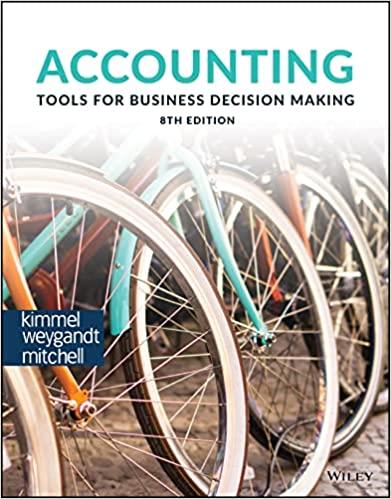Question
The following information pertains to Ford Food Service for the first two quarters of a year. Ford Food Service First Quarter Second Quarter Sales at
The following information pertains to Ford Food Service for the first two quarters of a year.
| Ford Food Service | |||
| First Quarter | Second Quarter | ||
| Sales at $5.20 per meal | $46,800 | $72,800 | |
| Total costs | 72,000 | 90,000 | |
| Income (loss) | ($25,200) | ($17,200) |
Each dollar of variable costs comprises of 50 percent direct labor, 30 percent direct materials, and 20 percent variable overhead costs. Ford expects sales units, price per unit, variable cost per unit, and total fixed costs to remain at the same level in the third quarter as during the second quarter. Ford sold 14,000 meals in the second quarter.
(A) What is the break-even point in meals (units) in a quarter?
(B) The company just received a special order from a government agency that provides meals for senior citizens for 12,000 meals at a price of $4.70 per meal in the third quarter. If the company accepts the order, it will not affect the regular market for 14,000 meals in the third quarter. Moreover, if the company accepts the order, direct labor costs per meal will increase by 10 percent for allmeals produced because of the need to hire and use new labor, and fixed costs will increase by $5,000 in the quarter. Should it accept the government order?
(C) Suppose the company believes that such orders from government agencies can become part of routine business. It expects that for every four meals it sells to its regular (i.e., existing) customer base at $5.20 per meal, it can sell two meals to government agencies at $4.70 per meal. The company expects that this sales mix will remain steady. As in part 2., if the company makes both types of meals, direct labor costs per meal will increase by 10 percent for allmeals produced, and the fixed costs will increase by $5,000 per quarter. How many total meals will the company have to make and sell in a quarter in order to break-even in this case? How many of these meals will represent sales to regular customers? In your opinion, will the company lose or benefit from adding this new line of business?
(D) This part is unrelated the parts 1-3 above. Referring to our discussion in class, we discussed two broad approaches to break-even analysis in setting with multiple products. The first approach is to first allocate the common fixed costs to individual products on some basis, and then conduct break-even analysis on a product-by-product basis. The second approach is to assume a certain "product mix" and compute the break-even point without having to allocate common fixed costs. Which method is theoretically more appealing and why?
Please show deatils of each step and answer each question or it will not be accepted. Thank you.
Step by Step Solution
There are 3 Steps involved in it
Step: 1

Get Instant Access to Expert-Tailored Solutions
See step-by-step solutions with expert insights and AI powered tools for academic success
Step: 2

Step: 3

Ace Your Homework with AI
Get the answers you need in no time with our AI-driven, step-by-step assistance
Get Started


